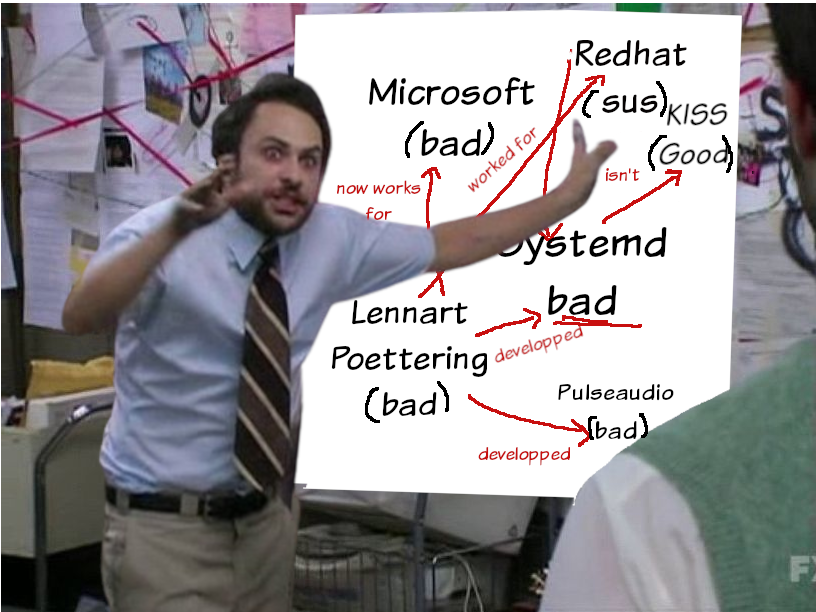this post was submitted on 07 Mar 2024
485 points (96.5% liked)
linuxmemes
21172 readers
903 users here now
Hint: :q!
Sister communities:
- LemmyMemes: Memes
- LemmyShitpost: Anything and everything goes.
- RISA: Star Trek memes and shitposts
Community rules (click to expand)
1. Follow the site-wide rules
- Instance-wide TOS: https://legal.lemmy.world/tos/
- Lemmy code of conduct: https://join-lemmy.org/docs/code_of_conduct.html
2. Be civil
- Understand the difference between a joke and an insult.
- Do not harrass or attack members of the community for any reason.
- Leave remarks of "peasantry" to the PCMR community. If you dislike an OS/service/application, attack the thing you dislike, not the individuals who use it. Some people may not have a choice.
- Bigotry will not be tolerated.
- These rules are somewhat loosened when the subject is a public figure. Still, do not attack their person or incite harrassment.
3. Post Linux-related content
- Including Unix and BSD.
- Non-Linux content is acceptable as long as it makes a reference to Linux. For example, the poorly made mockery of
sudoin Windows. - No porn. Even if you watch it on a Linux machine.
4. No recent reposts
- Everybody uses Arch btw, can't quit Vim, and wants to interject for a moment. You can stop now.
Please report posts and comments that break these rules!
founded 1 year ago
MODERATORS
you are viewing a single comment's thread
view the rest of the comments
view the rest of the comments

It's not inherently bad, it "fails" the Unix Philosophy of "Do one thing and do it well" but since Linux's kernel is:
It used to be a mess, but that's solved. The biggest reason to avoid systemd is mainly user preference, not anything malicious. 90% of current distros use systemd as its easier for the maintainers and package programmers to build for the general than each package and each distro having their own methods of how to do an init system and other tasks.
How Debian and Arch and Gentoo and Slackware and other big distros worked was different, and the maintainers of those packages had to know "Debian's way" and not a general way that most places accept. Systemd actually solved the Too Many Standards! issue.
I've never really seen a big argument against systemd, but maybe I've just not heard it.
It also didn't help that Poettering isn't particularly popular on a personal level. I think there would have been a lot less drama if he had better people skills.
Yeah, but to be honest, I would have terrible "people skills" too if people sent me death threats over writing a free software.
Doesn't take much to get death threats on the Internet, unfortunately. He probably would have received less of them with a better attitude, though. He wasn't full-on Ulrich Drepper, but still pretty divisive.
Yeah he seems kind of like a weirdo jerk.
back when you had an init system and you got it just the way you wanted it, you would be pissed that you had to move to systemd
now its there when you install and it is stable so it isn't a big deal. But old beards hate change.
Old beards built linux and everything around, have some respect.
Do you mean the past tense of the verb solve or the systemd service that solves mathematical equations? Because solveds code is still a mess. It used to too, but it still is.
🤓